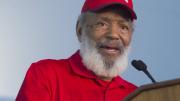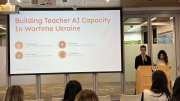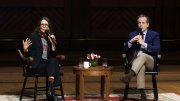The Graduate School of Education’s Convocation ceremony on Wednesday afternoon in Radcliffe Yard began with the exuberance of a pep rally and closed with three sets of personal reflections: on the importance of love; on the reason people enroll at the GSE; and on ways to improve public education, in part by restoring the kingdom of God to the process.
In opening the program, GSE dean Kathleen McCartney—clearly enjoying her final decanal Commencement week before departing to become president of Smith College—announced that 744 degree candidates from the school would be graduating the next day. Judging by the cheering that followed, almost all of them, along with their families and friends, were present. More cheering, whistles, and joyful whooping accompanied the announcement of the class gift—more than $16,000 raised for financial aid for next year’s class of 2014; the presentation of Intellectual Contribution/Faculty Tribute Awards to the top student in each of the school’s 13 master’s programs; the introduction of the class marshals for the master’s programs and the school’s certificate and doctoral programs; and the presentation of three special honors: the Phyllis Strimling Award, to Annie Peirce, incipient Ed.M., for her strong academic performance and plans to use her HGSE experience for the advancement of women and society; and the Morningstar Family Teaching Award to associate professor of education Tina Grotzer; and the Alumni Council Award for Outstanding Contribution to Education to Jeanne Brooks-Gunn, Ed.M. ’70, director of the National Center for Children and Families.
Then the more contemplative side of the convocation proceedings came to the fore. Richard Weissbourd, director of the school’s human development and psychology program and author of The Parents We Mean to Be, was this year’s students’ choice as faculty speaker. He quoted Justin Bieber lyrics and referred to the Twilight novels as evidence that harmful images of love and romance in the popular media are far worse for young people than the images of violence that attract so much attention. Guide young people to the courage and self-respect needed to develop true love relationships, he urged the audience—relationships that include those with colleagues and the students you teach. Remember that you can experience many forms of idealism throughout your life, he told them, and can seek, recalling novelist David Foster Wallace, the best way to spend your one breathtaking time on this earth.
In his student address, Ed.D. candidate Philip Lee recalled that before enrolling at “HUGS-E,” while working at Harvard Law School, he learned that four types of people wanted to go to Harvard: those who wanted to become rich; those who wanted to become powerful and influence society in profound ways; those who sought prestige; and those who came because of love. The last group, he said, had people in their lives who believed in them when they were feeling worthless; having experienced such love themselves, they wanted training that would enable them to “pay that love forward” to help others. Referring to the long struggle and resistance needed to change society, he asked, “Why do people keep struggling?” Cornell West, he told the audience, defines justice as “what love looks like in public.” “That’s why people come to HUGS-E!” he concluded. “Welcome to the tradition!”
The Convocation speaker, activist James Meredith, wearing a bright red Ole Miss baseball cap and shirt, received the school’s highest honor, its Medal for Education Impact. Dean McCartney reminded the audience of how he engineered “two of the most epic events of the American civil-rights era”: the desegregation of the University of Mississippi in 1962 and the March Against Fear in 1966, which helped open the floodgates of voter registration in the South. Most recently he has challenged his fellow citizens to help children achieve in the nation’s public schools by implementing evidence-based reforms, continuing his lifelong commitment to the right of everyone to an education.
Meredith said in reply that he considered the school’s recognition the greatest honor of his life. His talk touched on the history and future of Mississippi, the role of the black church and black Americans in particular in educating citizens, and the need to properly prepare all education-school graduates—not only those volunteering for Teach for America—for what they will encounter in the public-school system “where the masses of blacks who need education” are found. One problem with public-school education today, he asserted, is that the kingdom of God has been removed from the process; his statement prompted only a small burst of applause, which Meredith noted. God ordered Moses to choose the right kind of leaders to lead the people into the Promised Land, he said, and the only way to solve the problems of the youth is for the elders to always do their job. Toward the end, he turned to the parable of the Good Samaritan. Addressing the audience of educators, he said that those religious leaders who passed by and did nothing “probably asked the wrong question: ‘What will happen to me if I help this child?’ The question should be, ‘What will happen to this child if I don’t do my duty?’”









